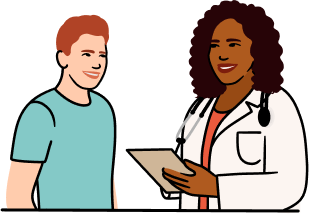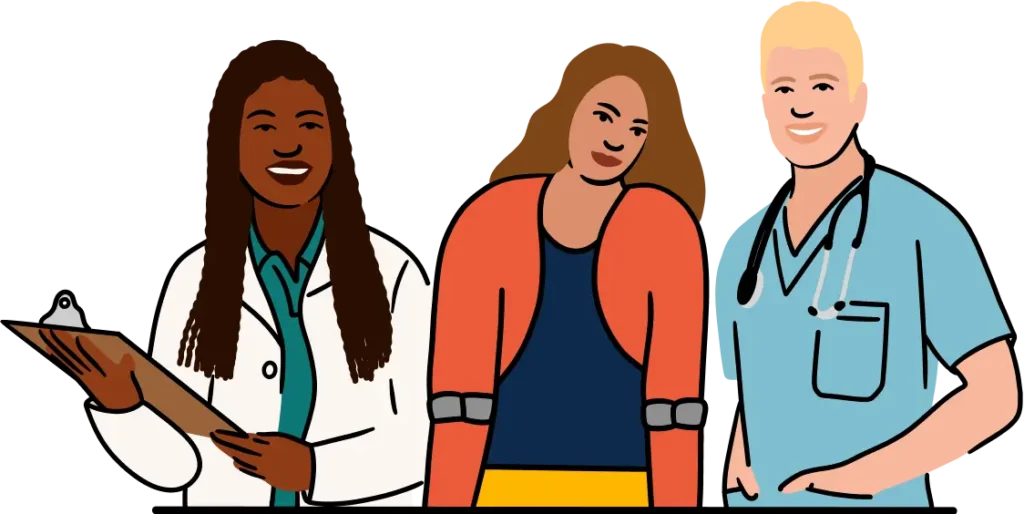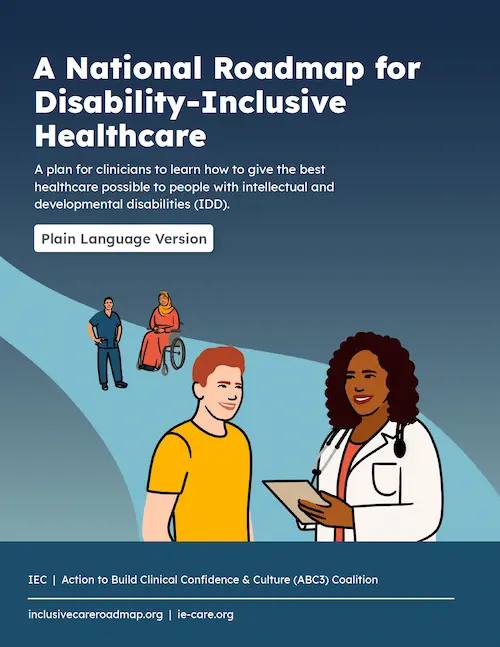Changing How Healthcare Is Taught
ABC3: Action to Build Clinical Confidence and Culture
A coalition of people with lived experience of intellectual and/or developmental disabilities (IDD) and healthcare experts working together to scale strategies nationally to better prepare clinicians for serving people with IDD.
Changing How Clinicians are Trained to Treat People with IDD
IEC launched the Action to Build Clinical Confidence and Culture (ABC3) Coalition to coordinate national strategies that aim to prepare general clinicians to serve people with IDD better. The coalition aims to scale change across education, licensing, and accrediting standards.
ABC3 coalition members include self-advocates, care partners/givers, clinicians, and leaders from clinical professional societies, disability organizations, clinical educational organizations, and accrediting bodies. They create and carry out campaigns and programs, develop materials, and gather resources to effectively change healthcare culture and enhance knowledge and skills among clinicians on a large scale.
- 1 in 20 Americans have IDD
- less than 1 per 100,000: the number of pediatricians currently certified in developmental-behavioral pediatrics
- 3x: how much more likely a person with IDD is to be denied healthcare than a person without IDD
- 60%: the percentage of physicians who say they feel unprepared to provide quality care to people with disabilities
Why This Matters
The majority of people with IDD rely on general healthcare practice settings for their care rather than specialized centers. Many live with chronic physical and mental health conditions, leading to more interactions with the healthcare system. Meanwhile, there is no national requirement for medical schools to teach about IDD – despite the fact that nearly one in 20 Americans has IDD. Nurses, dentists, physician associates, and other clinicians – whether in training or in practice – also don’t get the preparation they need.
With so little training, it is not surprising that nearly 2/3 of physicians say they feel unprepared to provide quality care to people with disabilities.
Clinicians are key to the healthcare experience for us all. This lack of training and confidence means people with IDD face additional barriers to quality care. They are more likely than the general population to receive lower-quality healthcare and access fewer preventative services, leading to unnecessary health problems and even preventable deaths.
ABC3 Highlights
Swipe left/right to navigate
2021
Established coalition of 18 members, including: American Academy of Pediatrics, Association of American Medical Colleges, and American Academy of Developmental Medicine and Dentistry.
2022-23
Identified key factors fostering clinician motivation for equitable care and illustrated the transformative journey from limited IDD understanding to clinician readiness.
2022-23
Held focus groups with 87 clinicians-in-training and in practice, as well as clinical education experts across different professions.
2024
Launched the National Roadmap for Disability-Inclusive Healthcare. The Roadmap is a plan for clinicians to learn how to give the best healthcare possible to people with IDD. It includes clear goals and commonsense actions for five groups that are particularly influential in how clinicians are taught.
2024
Partnered with Ability Central to improve healthcare visits for people with communication challenges.
The National Roadmap for Disability-Inclusive Healthcare
Everyone deserves high-quality healthcare. That’s why we developed the National Roadmap for Disability-Inclusive Healthcare, a plan for clinicians to learn how to provide the best healthcare possible to people with IDD.
Coalition Steering Group Members
The ABC3 Steering Group is a diverse coalition that includes people with IDD, care partners/caregivers, clinicians, and other healthcare leaders. The Steering Group operates collaboratively, based on the principles of Authentic Community Engagement – learning from the lived experience of people from IDD and the perspectives of healthcare professionals and creating commonsense solutions.
Click on each to expand
Project Lead
- Lauren Erickson, Director of Policy and Programs, IEC
Steering Group Members
- Accreditation Council for Graduate Medical Education
- American Academy of Developmental Medicine and Dentistry
- American Academy of Pediatrics
- American Academy of Physician Associates
- American Association of Colleges of Nursing
- American Association of Intellectual and Developmental Disabilities
- American College of Physicians
- American Dental Education Association
- Association of American Medical Colleges
- Autistic Doctors International
- BJ Stasio, Self-Advocate
- Developmental Disabilities Nurses Association
- ECHO Autism
- IntellectAbility
- Sherri Eldin, host, creator, & co-producer of the Annals of Family Medicine Podcast and self-advocate
- Tyler Urias, self-advocate
IEC is grateful for the following funders, whose support makes ABC3 possible:



Related Work
TOOL: National Roadmap for Disability-Inclusive Healthcare
The Roadmap is a plan for clinicians to learn how to provide the best healthcare possible to people with IDD.
Video: National Roadmap Explainer
This video provides a brief overview of why a National Roadmap is necessary and previews the clear goals and commonsense actions it sets out to achieve.
Webinar: Using the National Roadmap for Action
IEC hosts a webinar with clinician and self-advocate steering group members on putting the National Roadmap into action.
Making Healthcare Better and Safer for People with IDD
IEC partners with people with lived experience of IDD and healthcare professionals to change the way care is taught, delivered, and paid for by creating new programs that center patients.





